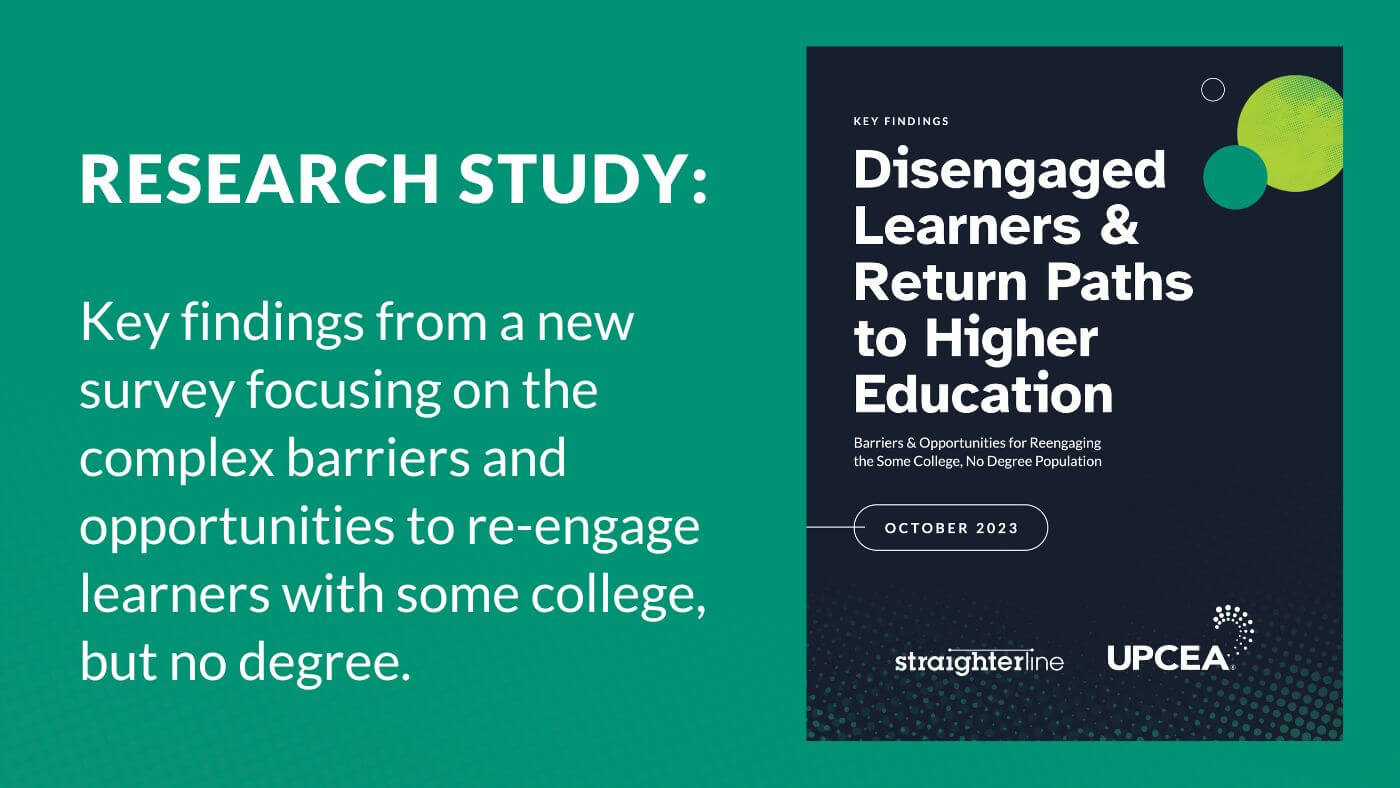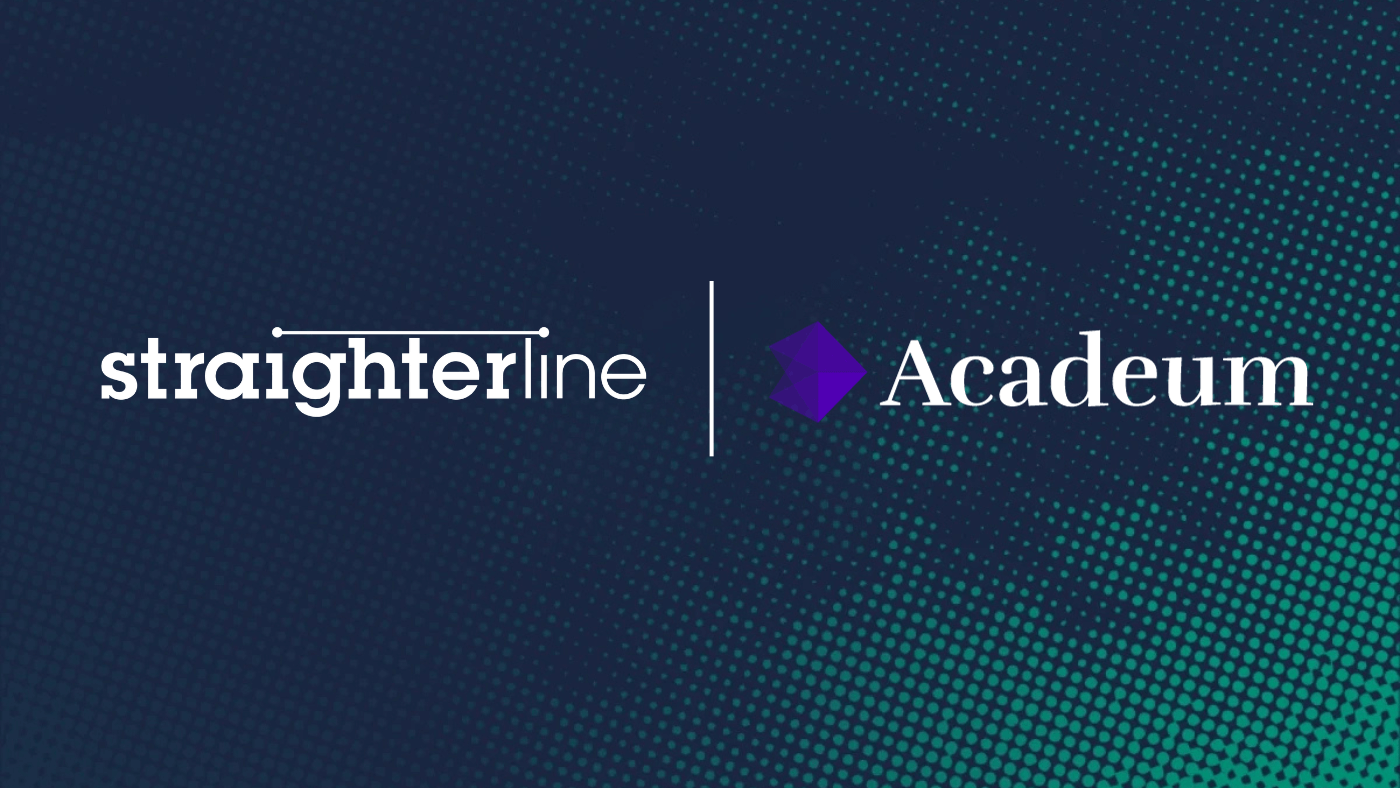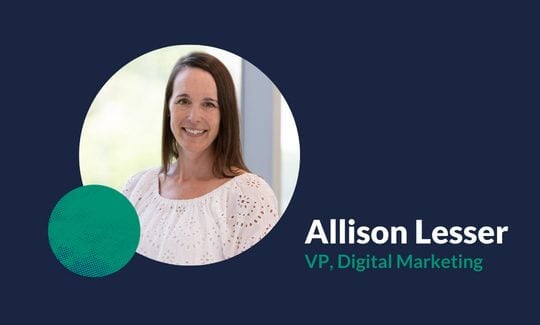New survey commissioned by StraighterLine and UPCEA delves into barriers to re-enrollment; opportunities for institutions seeking to re-engage adults with some college, but no degree
WASHINGTON, Oct. 31, 2023 /PRNewswire/ -- UPCEA , the online and professional education association, and StraighterLine today released the findings of a new survey focusing on the complex barriers and opportunities to re-engage learners with some college, but no degree. The study, entitled "Disengaged Learners & Return Paths to Higher Education," delves into the motivations, obstacles, and preferences of working adults looking to return to higher education.
"The survey sheds light on the complex—and often multi-faceted—reasons why individuals discontinue their education in the first place and what institutions can do to help these learners chart a course back to higher education and long-term pathways to upward mobility," said Dr. Amy Smith, chief learning officer at StraighterLine. "With today's tight labor market and fast-changing demands of employers, returning students are more cost-conscious and ROI-focused than ever. Not surprisingly, they expect institutions to find ways to offer credit and credentials for their academic, work, and lived experiences, and we owe them no less."
As universities and colleges struggle with declining enrollment and rapidly shifting student demographics, many institutions are looking for new ways to reach the nearly 40 million Americans with some college credit but no degree. The study also comes at a time when the share of first-time, full-time learners entering college directly from high school continues to decline.
One of the most significant findings of the study is that 57% of respondents had completed half or more of their degree program before they stopped out, indicating a strong desire to finish what they started. Additional findings from the survey include:
- A majority want to finish — and many are close. A majority of respondents expressed a strong desire to complete their education: 29% indicated they are extremely or very likely to return to higher education, with another 32% somewhat likely to earn a degree. Interest in degree completion was particularly high among those who felt their careers had plateaued.
- Cost and speed drive re-enrollment decisions. More than two-thirds (68%) of respondents prioritize cost when comparing programs to help them complete their degrees, and 56% considered the speed at which they could finish their degree as a crucial factor. Another third of former students cited the transferability of previously earned credits as a priority.
- Money, and career, aren't everything. Nearly half (48%) of respondents expressed a desire to pursue a degree to increase their salary, while almost one-third (32%) saw it as an opportunity for career advancement or change. A significant percentage (44%) identified fulfilling a personal goal as their primary motivation, while 27% said they were driven by their love for learning.
- Mid-career professionals see value in micro-credentials. More than three-quarters said receiving credit for prior learning (78%) or being able to earn alternative or micro-credentials that could stack toward a degree (76%) would increase or greatly increase their interest in completing their degree. Among respondents, mid-career individuals between the ages of 35 and 45 expressed the most interest in earning stackable micro-credentials.
- Learners value credit and credentials for past experiences. Nearly three-quarters (74%) of respondents said they would be extremely or very interested in re-engaging with college if institutions provided credit for their life or work experiences.
- Returning students trust institutions over intermediaries. Nearly three-quarters (74%) overwhelmingly listed an institution's website as their most trusted source in researching programs. They were far less likely to trust word of mouth (34%), college ranking sites (28%), email (18%) and social media (18%) for information on degree programs.
"This study offers invaluable insights into the mindsets and motivations of individuals who wish to return to higher education—which is critical at a time when institutions are looking to serve a generation of students that is more diverse in age, income, and professional status than any in history," said Jim Fong, chief research officer at UPCEA. "Ultimately, successfully re-engaging returning students requires us to empathize and understand their needs. Rather than asking them to adapt to higher education, we need to retool archaic systems in ways that work for them."
The survey is the latest in a series of research collaborations between StraighterLine and UPCEA designed to better understand the diverse needs and complex lived experiences of adult learners, including those who have disengaged from higher education. In 2022, the organizations partnered together to release a groundbreaking new survey examining students' lived experiences and perceptions around transferring college credits.
Conducted between June and July 2023, the survey by UPCEA and StraighterLine used an electronic questionnaire targeting learners 18-64 years of age who have some college experience but no degree. View the key findings here.
###
About StraighterLine: StraighterLine is the leading provider of high-quality, affordable, online courses that help learners earn college credit and meet their professional goals. In 2022, StraighterLine acquired ChildCare Education Institute (CCEI), one of the largest online training providers for early childhood education professionals. Each year, a combined 150,000 learners from StraighterLine and CCEI take one of 250+ online courses or certification programs to upskill into new careers or earn credit from over 3,000 colleges and universities worldwide. StraighterLine works with institutions and corporate partners to provide their students and employees with flexible education options that allow them to work and learn at their own pace. For more information on StraighterLine, visit https://www.straighterline.com. To learn more about CCEI, visit www.cceionline.com.
About UPCEA: UPCEA is the online and professional education association. Our members are continuously reinventing higher education, positively impacting millions of lives. We proudly lead and support them through cutting edge research, professional development, networking and mentorship, conferences and seminars, and stakeholder advocacy. Our collaborative, entrepreneurial community brings together decision makers and influencers in education, industry, research, and policy interested in improving educational access and outcomes. Visit upcea.edu.











